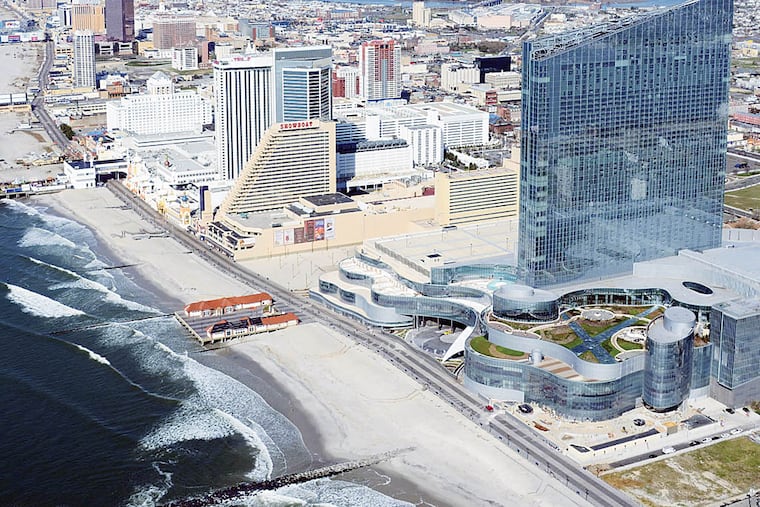Atlantic City facing unprecedented economic collapse
The Atlantic City region is on the brink of a short-term economic disaster. Atlantic City made history 36 years ago when it opened the first legal casinos in the United States outside Las Vegas.

The Atlantic City region is on the brink of a short-term economic disaster.
Atlantic City made history 36 years ago when it opened the first legal casinos in the United States outside Nevada.
Now it's doing so again as casino employment - which for years exceeded the number of city residents - drops precipitously after a decade of steady decline.
The closing of three casinos, starting with Showboat and Revel this weekend followed by Trump Plaza two weeks later, and the rapid-fire loss of 5,700 jobs, draw historic comparisons to longer-term collapses of U.S. industries such as steel.
"This is a massive economic body blow to Atlantic City on par with the hit to the national economy during the Great Recession," said Mark Zandi, chief economist at Moody's Analytics in West Chester.
Beyond the thousands of job losses, which will spread into related industries and the general economy, Atlantic City will soon be left with four empty buildings (including the shuttered Atlantic Club) that have no clear future.
"What we've got in Atlantic City is unprecedented. It hasn't happened before in this type of context, where they are going to shutter them up and literally can't give them away for pennies on the dollar, like Revel," said Alan Silver, a former casino-industry executive who teaches at Ohio University in Athens, Ohio.
Silver and other casino-industry experts said there was little precedent for reusing casinos for anything other than hotels.
David G. Schwartz, director of the Center for Gaming Research at the University of Nevada in Las Vegas, could point to only one former casino in the United States - the Golden Phoenix in Reno - which was turned into condominiums.
In addition to condominiums and time-shares, experts are quick to mention boutique hotels, which have become increasingly popular in Las Vegas and other cities.
"It's nice to do all these things, but you've got to have supply and demand and you've got to have the various attractions there to get people to come to Atlantic City," Silver said.
Atlantic City Mayor Don Guardian, who has adopted a salesman-in-chief attitude since taking office in January, spoke optimistically last week of openings expected next year, including a Bass Pro Shops location and Harrah's Conference Center, that could create 1,300 jobs in the city.
Guardian expressed confidence Friday that Revel would be resurrected as a casino under a new name, projecting that it would sell for $25 million to $50 million. That would also reduce the job losses.
"At $50 million, it's certainly a bargain-basement price for a brand-new facility. It's finding the right buyer, meaning having the financial wherewithal, and then that buyer finding the right brand to come in and run it," he said.
Fitch Ratings estimated Friday that $280 million of the $457 million gamblers lost during the last 12 months at the casinos that are closing would be captured by the survivors. That will help boost profits, and perhaps add some jobs at those properties.
Caesars Entertainment Inc. said more than 470 of the 2,068 Showboat workers had found jobs at other Caesars operations, mostly in Atlantic City. That announcement Friday reduced anticipated losses from 6,100.
Those transfers will soften the blow, but Atlantic City - which lost 1,600 jobs when the Atlantic Club closed in January - still must brace for historic job losses.
"This concentration both in terms of number . . . and almost within a single month probably, is unprecedented" in New Jersey, said James W. Hughes, dean of the Edward J. Bloustein School of Planning and Public Policy at Rutgers University in New Brunswick.
Hughes, coauthor of one of the earliest studies of New Jersey's public policy gamble on casinos, said downsizing in the steel and auto industries was typically gradual, reducing shifts, closing units.
In Bethlehem, Pa., for example, jobs at Bethlehem Steel Corp., whose operations once stretched five miles along the Lehigh River, dribbled away from a peak of more than 30,000 during World War II. There were 13 when the plant closed for good in 1998, the Allentown Morning Call reported at the time.
"Here, it's like falling off a cliff," Hughes said of the situation in Atlantic City.
In the 1990s, employment in Atlantic City casinos hovered around 45,000 most years, though it peaked at more than 49,000 in 1997. During that period, the city had about 38,800 year-round residents, according to census data.
The casino jobs that will be lost in the next two weeks will bring the total down to around 26,000. The losses represent more than 4 percent of Atlantic County's labor force of 131,800.
Zandi said the loss in the Atlantic City region would rise in the next year as consumer and government spending falls, possibly matching the 6 percent job loss nationally from the start of 2008 through mid-2009.
"Atlantic City has admirably weathered many economic storms - unfortunately, another big one is coming," Zandi said.
215-854-4651
@InqBrubaker